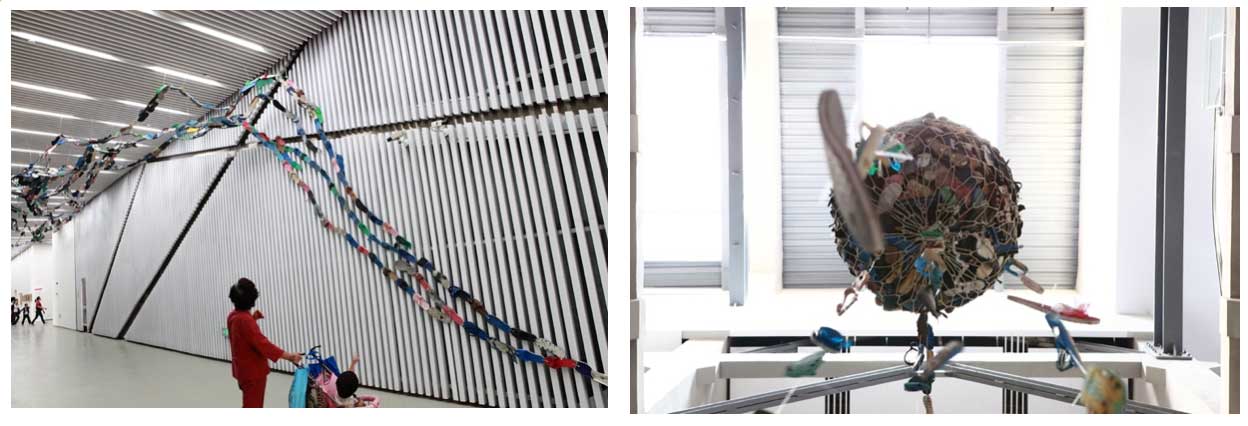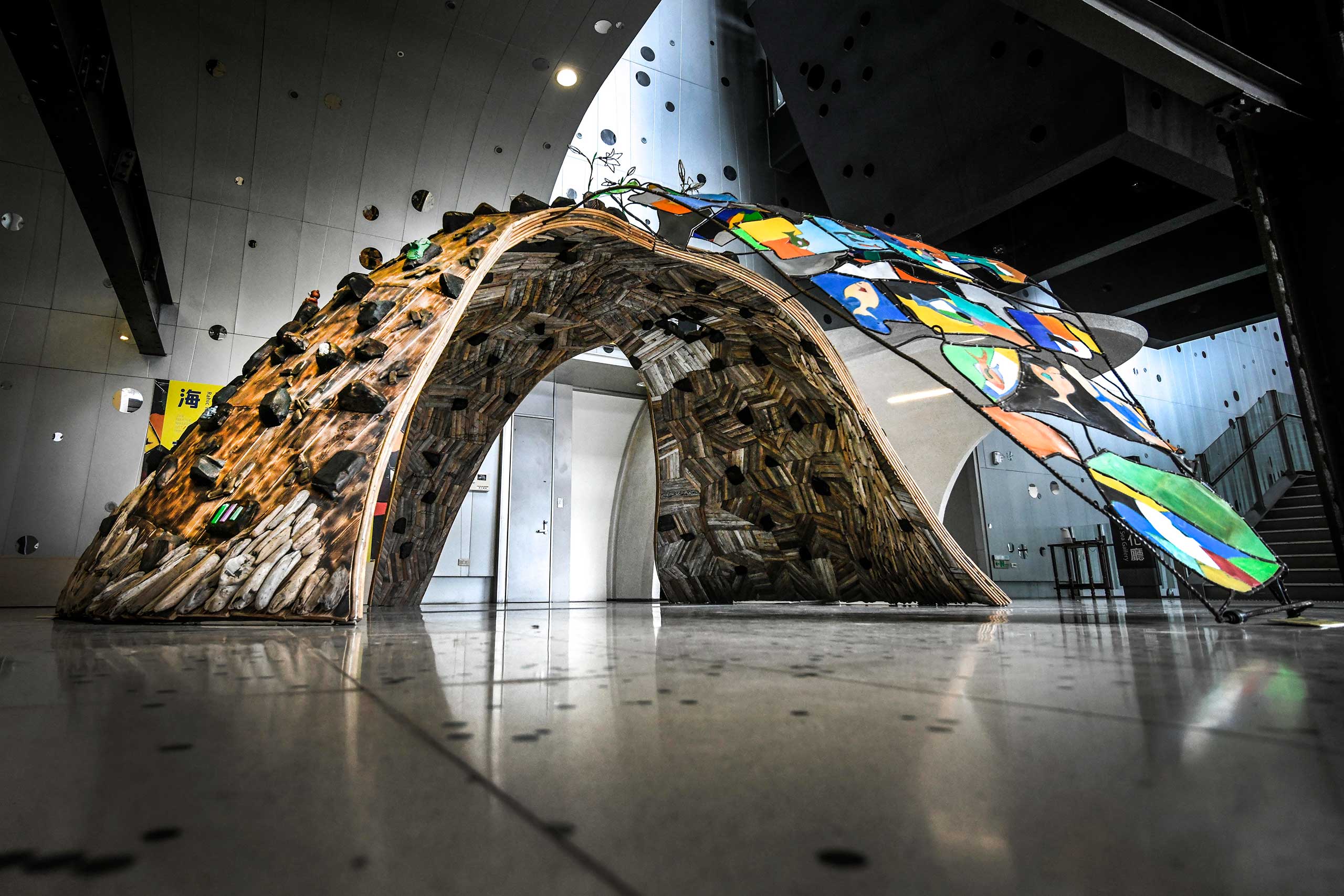策展被視為一種認識論的技術,甚至可以說,是爭辯本體論政治的舞台。在當代藝術中,與本體知識論相關的研究已經成為策展人、藝術評論者和藝術家們討論的核心議題。相較於傳統藝術著重於美感、風格和流派,當代藝術不僅與科學一樣能夠提供客觀的知識,成為建構認識論的基礎;並且,藝術的認知方式也不同於理性主義的知識建構,而是直面惰性思維,開闢了以各種感官體驗為基礎的認知結構新視野。
博阿范圖拉·德·蘇薩·桑托斯(Bonaventura de Sousa Santos)使用「知識論屠殺」(epistemicide)一詞,旨在強調在殖民主義、資本主義、父權制的霸權統治下,北方知識論對全球南方知識論的排斥、歧視等暴力行為1。因此,討論當代策展,首先必須面對本體論和認識論的基本問題。不僅因為策展是一種知識生產,更因為本體論和知識論都和經驗密切相關,理應發展出多元化繁榮發展的本體論和認識論。不同的本體論和認識論並不必然相互拮抗和矛盾,也可能共享相同的價值。不同的個體,也並非只能抱持單一的本體論和知識論,極可能認同多個本體論和認識論,而擁抱多重宇宙的世界。生態女性主義哲學家克芮絲·寇默(Chris Cuomo)所提出的「繁盛倫理」(ethics of flourishing)2,旨在說明女性主義以謀求個體、物種和共同體的繁盛為出發點的倫理思考。本專輯借此指涉印尼、泰國和柬埔寨等地,藉由不同策展實踐所秉持的多樣而異質的知識論。
倘若「策展就是以一種言說和行動的方式,照料與他人共在的空間,開創一個無論是城邦或其他方式名之的地方」。那麼,印尼、泰國各地的雙年展和柬、越的城市型展演,如何透過策展實踐建造「共在的空間」?在特定空間的知識脈絡和發言位置上,如何在實際的生活與文化背景中,進行知識論的論述、轉化或陳述,並積極扮演批判性思考者和有效的行動者。本期內容以各地實際發生的藝術展覽為案例,試圖探討本體認識論繁盛倫理的潛在可能性。
多重宇宙本體認識論
根據博阿范圖拉·德·蘇薩·桑托斯(Boaventura de Sousa Santos)的分析,我們處於一個由資本主義、殖民主義和父權制三種主要統治形式主導的現代世界。顯而易見的悲劇在於,這些統治形式以協調的整體運作,而對它們的抵抗則顯得支離破碎、零散無序3。更嚴重的是,這些統治模式不僅僅是一種經濟或政治模式,而是一種以歐洲為中心的文明範式。這種文明範式透過大量霸權知識——北方的認識論——為其維護其地位,並以此否定其他被殖民和被剝削的地方和居民。桑托斯將這些被北方認識論否定的地方稱為全球南方4。他強調必須要和北方認識論保持距離,但這並不意味著要完全拋棄歐洲中心主義豐富的批判傳統,而將其扔進歷史的垃圾箱,忽視西方現代性社會解放的歷史可能性。相反地,這表示著可能將其納入更廣泛的認識論和政治性的範疇。換言之,必須特別關注西方大傳統中被壓製或邊緣化的小傳統5,並逆轉目前認識論屠殺(Epistemicide)的現況。
基於相似的理由,馬丁·薩夫蘭斯基(Martin Savransky)呼籲重新檢視知識生產的角色和影響。根據他的研究分析,圍繞著知識(地緣)政治(the (geo)politics of knowledge)的辯論可能受益於去認識論化( de-epistemologization)的過程,亦即將認識論視為世界自身生成流變的過程,而非將知識的生產視為一系列複數的、或多或少符合正義的多樣世界的表現。他指出,伊莎貝爾·絲坦傑(Isabelle Stengers)、布魯諾·拉圖(Bruno Latour)、阿弗烈·諾夫·懷海德(Alfred North Whitehead) 和威廉·詹姆斯(William James )等作者的思路,即是嘗試在「世界進程」(process of the world)中引入「知識政治」(politics of knowledge),以突破認識論導向方法所帶來的限制;並且,能夠讓「孤立實體」(solitary entities)做為透過社會和技術實踐所建構的物質世界的實體,從而凸顯其重要性6。薩夫蘭斯基提出另一群人發展出與此互補的觀點,並稱之為「本體認識論多元化」(onto-epistemological pluralism)。依照其分類,桑托斯所提出的南方認識論屬於這個陣營。換言之,必須探問的是:誰人/何物、在何時、如何棲息於什麼樣的世界(who/what, when and how inhabits what world);而非誰人、何時、為何建構知識(who, when, why is constructing knowledge)。如前所述,前一陣營主要透過追隨伊莎貝爾·絲坦傑等人的研究,著重於探索「知識的本體政治」(ontopolitics of knowledge)的可能性。與此相反地,形成對照的後者標榜「本體認識論多元化」。兩者的差異,充分彰顯出西方和非西方知識實踐之間的歷史辯論,並在很大的程度上構成了真正的現實政治7。薩夫蘭斯基宣稱:「世界,或者更確切地說,複數的世界,不是要被代表或表述的,而是由參與世俗實踐的實體之間正在進行的談判所塑造的。從這個意義上而言,知識的政治變成了現實的政治,或者用安瑪莉‧摩爾(Annemarie Mol)的話來說,我們可以稱之為「本體政治」(ontopolitics)8。」
漢娜·鄂蘭(Hanna Arendt)根據奧古斯丁的《上帝之城》中的說法,神創造人,就是為了在世界當中引入開始的能力,亦即自由;她據此發展出行動的生命(viva activa)的概念。根據鄂蘭的說法,每一個個體的誕生都是一個新的開始(initium),因為每個個體都是獨一無二的,在他們誕生之前,世界上不存在其他相同的人;因此,每個人的出生都意味著某種新的事物被引入世界9。況且,人是複數的,因此,「新生性」和「複數性」成為人的生命的最顯著特徵。此外,從「沉思的生活」和「行動的生活」的位階翻轉,成為她所認定的近代世界最重要的精神性影響10。從沉思轉向行動的原因在於人對知識的渴望。鄂蘭認為在獲取知識和探索真理方面,被動的觀察和沉思是不可靠的,唯有倚靠行動,因為「知識只和自己親自做的事有關」,同時「知識的本性在於,只有透過更多的實踐才能驗證知識」11。除了藉由積極的行動而將人的精神性從被動的沉思中解放之外,鄂蘭還從康德思想遺產中提煉出判斷(judge)、共感(common sense)和品味(taste)12的政治性潛力。判斷能力不僅僅是透過個人的視角,而是憑藉每位在場者的角度來看待事物;換句話說,判斷的政治性使人能夠在他人臨在的公共場域和共享空間中定位自我。在此意義上,鄂蘭認為屬於主觀性的五感和相應的感官,讓我們可以適應一個非主觀的客觀世界,「判斷乃是使這種『與他人共享這個世界』(sharing-the-world-with-others)得以實現的一項(就算不是最重要的)重要能力」13。她所演繹的「品味」的政治能力,主要體現在人們對愉悅或不悅的同好經驗的發現上,品味具有塑造世界和社群歸屬的屬性;換言之,品味的判斷讓人格品質(personal quality),亦即「此人為誰」(who one is)得以公開顯現。更甚者,品味超越政治範疇,具有不證自明的強制效力,作為心靈陶養(cultura animi)活動而運作。透過品味,可以以非暴力的方式使世界變得更加文明化,並以「人格性」的方式關懷美好事物,從而創造出「文化」14。就其「行動的生活」的概念來看,鄂蘭不談大寫的存有(Being),而強調「顯露」(appearance),而存有者對她而言,是「那對所有人開顯的」15。總而言之,強調行動是探索本體或認識的唯一可信方式。
策展的認識論實踐
在唐納德·普雷齊奧西(Donald Preziosi)的觀點中,策展實踐被視為一種具有潛在危險的行為。他指出策展是一種認識論技術(an epistemological technology),一種思維技巧,並且,可能引發神聖的恐懼(divine fear)或神聖的恐怖(holy terror)。因為我們根據對世界的感知導航,而這種感知卻隨著世界的變化而不斷改變。簡而言之,策展是一種創造性表演,透過利用世界來思考、確認和改變世界。因此,策展本身就是對現實的挑戰16。布雷奇歐的觀點有兩點值得關注。首先,引發神聖的恐懼和神聖的恐怖是源於對變幻世界的感知;因此,策展認識論技術可能並非全然正面的,有可能引起恐懼和恐怖。恐懼可能出於威脅性,恐怖則可能來自暴力性,而缺乏認知正義的認識論,便可能具有這兩種效果。其次,他認為策展是利用世界來思考,而並非僅僅藉由「物」(通常指藝術作品)來思考的觀點,也為世界繁多的知識論開啟了可能性。
在當代,對於認知正義的普遍質疑下,如何進行更具批判性、政治性的策展思考是當前策展人面臨的難題。由於本體論和知識論與經驗密切相關,理應發展出多元化、繁榮的本體論和認識論。因此,我針對抵制現有知識體系不遺餘力的女性主義、全球南方、後殖民、原住民等知識論簡要介紹,希冀透過不同的知識論,嘗試描摹一個簡化版的多元本體知識論生態系。不同的本體論和認識論並不必然相互拮抗和矛盾,也可能共享相同的價值。不同的個體,也並非只能保持單一的本體論和知識論,極可能認同多個本體論和認識論,而擁抱多重宇宙的世界觀。
本體認識論
本文將本體論視為關於存在本質和現實本質的理論。換言之,每個人對真實世界的觀察和體驗,除了個人的感官經驗之外,還取決於所秉持的觀念;故而難以給出明確的答案。為了解釋何謂真實,人們發展了本體論信念體系,以此來解釋真實的本質,並藉此信念來尋求有關這個公認現實的更多真相。簡而言之,本體論探討的是「什麼是真實的?」而認識論則是關於思考或認知本質的研究,牽涉到如何獲得知識的理論。認識論是建立在本體論之上的整個思維系統和認知風格。認識論和本體論是一體的,因為界定何為「真實」將影響對「真實」的思考17。
女性主義本體認識論
根據女性主義學者利茲·史丹利(Liz Stanley)和蘇·懷斯(Sue Wise)的觀點,認識論被視為一種框架或理論,用於描述世界知識的組成與生成,即關於如何理解「現實」的知識結構。認識論界定了什麼是知識、如何識別知識、誰是知識的生產者、傳播者和傳播的方式。她們認為,認識論問題對女性主義來說至關重要。故而,唯有建構女性主義認識論,方能真正挑戰非女性主義的知識框架和研究方式18。
在政治關係中,越來越多的人開始意識到知識理論與權力關係的緊密聯繫。這些關係通常受到認知權威的影響,其中包括性別、種族、階級、性取向、文化和年齡等差異,而造成的知識階級秩序。性別無法被單獨作為一個分析類別,而是必須被視為與其他等級制度相互關聯的一部分19。對於利茲·史丹利蘇·懷斯而言,女性主義認識論需要充分理解女性經歷,這涉及倫理與政治的選擇,是一種透過認知共同體的活動和代碼所建構的觀念體系和理論20。她們強調,被壓迫者的本體論被消極地描述為他者,與主流意識形態的本體論和經驗相互對立。因此,被壓迫群體的政治計畫核心在於日常生活的建構,用一個本體論系統來解釋、定義和建構其存在的世俗現實。想當然爾,這個本體論的內部也存在碎片和差異21。在女性主義認識論中,基於女性主義本體論,身體和認知、思想體驗被視為文化文本的一部分,其意義和經驗在文化和政治框架中被銘刻。因此,掌握身體、思想和情緒等不同媒介所獲得的體驗,並透過分析這些體驗或詮釋其文化特殊性,成為追求的目標。在傳統的主流認識論中,情緒通常被視為對知識的破壞和顛覆,是一個不服從理性的科學調查和控制的荒野;相較之下,女性主義認識論拒絕這種笛卡爾式的理性/情感二分法,將情感定位為文化產物,可以和其他文化銘刻的行為形式一樣,進行理性分析22。在女性主義的本體論中,「身體」更像是一種體現,一種文化過程,透過這種文化程序,身體成為有爭議的意義、經驗和感受的場所。在此,「身體」被定位在特定文化脈絡—可能是彼此競爭的—所擁有的意義、權力和控制的論述之中。對她們而言,「身體」被概念化為一種生成,類型和意義處於流變的狀態。
針對身體意義的生成流變,法國女性主義者如海倫娜‧西蘇(Helene Cixous)23、茱莉亞·克莉斯蒂娃(Julia Kristeva),尤其是路思·伊瑞葛來(Luce Irigaray )提供了重要的理論基礎。伊瑞葛來解構了陽具中心構成的性欲秩序,主張女性的性行為是基於陰唇接觸和愉悅至上的多元性愉悅。因此,她將女性定位為性主體,而非男性慾望的性客體。她建構了一套理論,超越了本質主義與建構主義的二元對立,既探討了女性的性自主權,又模糊了生物本質論和社會建構論之間的界限。伊瑞葛來對女性身體的本質主張,被視為一個成功的政治策略,因為它為女性提供了一個在思想、語言層面取得主體地位的途徑24。
另一組女性主義研究者琳達·阿爾科夫(Linda Alcoff)和伊麗莎白·波特(Elizabeth Potter)則指出,認識論的目的不僅是為了滿足求知慾,而是實現解放的目標,擴大知識生產的民主性。因此,必須探索知識的授權方式以及誰擁有知識的權力。這種認識論必須是反身性的,能夠揭示社會現實,並且必須透過現實生活中的政治鬥爭來檢驗,而非在學院的參考框架中作為參考25。簡言之,要解放女性,就必須同時解決所有形式的統治,因為每一個受壓迫者的行列中都有女性的身影。事實上,「女性」本身並不存在,甚至,女性本體論也已經發生了變化。高種姓的印度小女孩、年長的異性戀拉丁裔和工人階級的白人女同性戀,每個個體都生活在壓迫之網的不同節點。因此,將解放之路稱為女性主義並不意味僅針對女性,而是受到女性主義的啟發,尋求解開壓迫之網並重新編織生命之網26。
南方本體認識論
從桑托斯的視角來看,與歐洲中心主義保持距離意味著認識到世界經驗的多樣性,無法用單一的理論來解釋,因此需要一場認識論的運動27。讓和約翰·科馬羅(Jean and John Comaro)認同桑托斯所倡議的認識論運動,認為透過向南方學習重新啟動現代政治想像,南方與其說是地理空間,不如說是認知空間。重新認知被視為一種鬥爭、抵抗,和世界主義的替代理論來源。從這個意義上來看,南方既是現實也是「進行中的提案」,代表著新興的政治可能性、多元的歷史和充滿著希望的未來28。
南方認識論旨在加強新興知識,來自全球南方的認識論和本體論試圖創造條件,讓受壓迫的社會群體可以依照自己的方式代表世界,以便根據自己的意願,以自己的方式改變世界。同時,強調藝術和感官在認識論中的作用。一直以來,北方認識論都將藝術排除在理性主義知識的經典之外,因為藝術始終被視為情感、創造力和主觀性的領域。因此,需要一個對抗的認知空間,運用藝術語言來重新建構主體及其歷史,使用藝術語法談論抵抗的鬥爭。思考社會鬥爭中產生的經驗需要從認識論、地理和政治的角度進行思考。就這個角度來看,南方具有豐富而多樣的特質。如上所述,透過跨文化和跨政治的翻譯對話,南方與南方之間的交流,意味著從各種角度生產合理的、相關的知識,並運用不同的方式加以表述。南方認識論需要一種新的倫理關係,以生產具有表演性、治癒性和變革性的知識;它超越去殖民、民主化和去父權論述,突顯南方的崛起,關注受壓迫的個人和集體主體的知識。這種知識是不守規矩的、破壞性的和叛逆的。南方認識論的倡導者並未試圖將南方知識論呈現為一個單一的理論語料庫,而是堅信,我們需要一個由不同的鬥爭、不同的替代宇宙學組成的理論替代品,以確保不再有所謂的邊緣,並確保全球南方成為多元世界不可分割的一部分,擁有不同的知識生產中心29。
原住民本體認識論
全球各地的原住民族,無論在政治、文化還是經濟層面,皆處於不同程度的壓迫之下。更為迫切的問題是,他們長期以來受制於其他認識論,導致處境更加劣勢。
根據加拿大原住民學者尚·威爾森(Shawn Wilson)的論述,原住民研究始於對知識具有「關係性」特質的世界觀的理解30。他強調原住民哲學的核心是關係性,即關係即現實,現實即關係。因此,原住民相關研究被視為一種將關係聚合在一起的儀式31。他相信原住民認識論和本體論以關係為基礎,而價值論和方法論則是基於維護關係的責任。所以,研究是一種儀式,目的在於建立更緊密的關係或彌合宇宙各個方面與我們之間的距離。他所提出的原住民研究範式(an Indigenous research paradigm),由原住民本體論、認識論、價值論和方法論所組成。這些信念影響了研究人員用來了解宇宙的工具。他宣稱,對原住民來說,原住民身份的一部分,包括獨特的世界觀和看待存在的方式。原住民族意識到,除了選擇的研究主題之外,研究方法需要納入他們的宇宙觀、世界觀、認識論和倫理信仰32。
威爾森引述瑪雅學者卡洛斯·科爾德羅(Carlos Cordero)的說法,強調原住民研究範式和西方知識體系的差異33。科爾德羅描述兩者的差異在於,西方知識體系將科學領域與藝術和宗教的領域分開;原住民知識庫則將這些領域整合在一起。因此,西方傳統強調透過智力獲取知識;原住民知識則是經由感官和直覺取得34。
威爾森總結指出,若要理解原住民的認知方式,必須透過一個關係性的鏡頭。在原住民本體論中,可能存在多個現實,就如同建構主義研究範式一樣。因此,現實並非一個對象,而是構成原住民本體論的不同關係集成,是一個關係的過程。原住民本體論和知識論,同樣都是以關係性為基本信念。認為知識與所有創造物共享,不僅是人際關係,也是與宇宙、動植物和地球的關係。知識超越個人,是關係性的35。除了關係性外,威爾森還強調土地對原住民社會的重要性。土地被視為至高無上的,塑造了周圍一切的經歷,是地方、環境、現實和人所在的空間。他特別點出空間對原住民的意義,高於時間在西方傳統思想中的重要性36。作為原住民研究者,他選擇忠於自身背後的世界觀與哲學,為保護自身權益與神聖的關係法和知識產權而鬥爭37。
威爾森這種以關係為核心的原住民本體知識論觀點,在許多其他學者的著作中也有所體現,例如佐依·托德(Zoe Todd)、伊娃·塔克(Eve Tuck)38和瑪西婭·麥肯齊(Marcia McKenzie)39等。台灣阿美族藝術家拉黑子·達立夫則從超越土地和生物的角度出發,關照連結整個地球的海洋和物質(包含人造物),提出突破人類中心的、流動的本體認識論視野。台灣泰雅族藝術家尤瑪·達陸則以泰雅編織作為關係的手段,發展出連結神靈編織的泰雅傳統Gaga以及當下生存處境的知識論40。


朝向本體認識論的繁盛倫理
當今,有人宣稱抵抗知識論屠殺,有人呼籲建構替代性知識論,也有人主張建構個別獨特知識論。或許,阿爾貝托·科爾辛·希門尼斯(Alberto Corsín Jiménez)所提倡的蜘蛛網人類學(spiderweb Anthropologies),適合作為當代本體論與認識論的其中一種比喻。他解釋道,蜘蛛網的形象能夠協助我們思考當前不穩定的世界。蜘蛛網既是陷阱,捕捉著獵物和掠食者的世界;同時也是生態和基礎設施,藉此描繪出生態系統的具體結構。
他運用蜘蛛網陷阱啟動的方法,亦即一種特定類型的遞歸操作(recursive operation)——蜘蛛織網,每天吃掉一部分來恢復織網時消耗的能量——來描述未來環境,並將其視為一種雙重環境化技術;換句話說,在消除現有世界的一部分的同時,將世界再重新編織成形。描述世界和世界化描述(describing worlds and worlding descriptions),同時發生。蜘蛛網陷阱藉由捕捉和環境化每個新描述做為發展方法,諸如黏性糾纏、地形改造生態、物質欺騙等。陷阱是二十世紀科學中常見的認識論比喻,但是,陷阱可能會捕捉到意想不到的獵物,所以,網絡必須預測蜘蛛無法用其獨立感官所預見的獵物。我們可以在蜘蛛網的編織中認識到自然計畫的統治,它是一種本體生態學的象徵。換言之,自然是一個陷阱,生態是它的基礎設施,蜘蛛網則是調節它們之間的糾纏的界面。希門尼斯認為阿爾弗雷德·蓋爾 (Alfred Gell)是為數不多認真看待陷阱比喻的人類學家之一。眾所周知,蓋爾認為藝術品具有陷阱功能,因為它們成功地在其環境影響圈附近,保留了社會關係的複合體。他斷言陷阱與杜象的現成物作品雷同,都是將世界建模為人類與環境的糾纏。他指出,陷阱是一種模型,也是一種工具。做為代理獵人,它會為主人進行狩獵41。綜上所述,希門尼斯重申陷阱可以被證明是一種富有成效的人類學技術,是由於它有許多不同的方式可以產生「在不透露上下文的情況下懸置」(suspension without releasing the hold of context)的機制。陷阱的運作方式影響了人們看待知識論的操控機制。此外,他舉例城市家具的原型正是以這種方式運作,它們提供社交誘惑的條件42。
倘若,從蜘蛛網比喻來闡釋知識論,本體論的運作機制或許可視為一種政治命題。伊莎貝爾·絲坦傑(Isabelle Stengers)就提出本體論政治(Ontological Politics)挑戰的說法。她宣稱本體論有很多含義,政治也是如此。她斷言外交官在某種程度上就是投機的產物,介入戰爭並致力於可能的和平。允諾一個包容許多世界共存的可能性,意味著外交要角們同意和平是一種可能性,他們同意「給和平一個機會」:這是外交干預的條件。然而,本體論政治意味著另一種假設,即全球西方(the global West)不可靠,它被描述為一台「機器(machine)」,破壞了政治和本體論43。這台機器無法實現和平,因為它只熟悉「和解」和警察行動44。她主張必須放慢腳步,理解布魯諾·拉圖 (Bruno Latour) 所構想的「萬物議會」(Parliament of Things)的侷限性。因為,萬物議會保留了希臘政治的定義,亦即一群人可以自由協商一個問題,這些人可以隨心所欲地表達不同的知識和經驗。然而,那些透過反對而破壞議程的人,將問題中涉及的某些方面描述為不可協商的人,很可能會被拒絕,並被視為純粹的麻煩製造者。她創造了「宇宙政治」(cosmopolitics)這個詞,以克服這種局限性為前提來思考。前綴“cosmo-”旨在讓顛覆變得重要,它暗示將破壞性事件描述為進入人類審議「動機」的場景,這些「動機」不接受依賴於審議和交易的制度。她提醒人們不要忘記,我們是社會和文化根除行動的繼承人,以文明和理性的名義在其他地方犯下罪行的先驅45。她援引唐娜·哈拉維 (Donna Haraway) 從安娜·青 (Anna Tsing) 那裡借用的「生活在廢墟中」(living in the ruins)的公式。雖然一些廢墟比其他廢墟更舒適,但現在到處都在探討如何在廢墟中生活的問題。本體論政治的挑戰不應從這個廢墟問題上抽離,而應利用它來激活學術廢墟46。一言以蔽之,她強調本體論政治的理念需要故事、儀式、交涉方式、思維方式和感受方式的變革魔力,它們可以重塑我們的廢墟世界,並打開它們與其他世界的部分聯繫。這也是我們可以留給下一代的唯一遺產,也許可以幫助他們,創造和廢墟中生活不一樣的生存方式47。
我們藉由感知體驗世界,倘若對不同的本體論和認識論沒有基本的認識,以「照料」為名的策展,極有可能在照料和控制的兩極天秤上,因本體論和認識論的偏見,而完全朝向控制的方向,形成一種認知暴力。故而,建構以多重宇宙論為基礎的本體論和知識論生態系,並確保生態的平衡發展,成為當代藝術策展意識中的關鍵概念。「神聖的恐懼」或許因為繁多的本體認識論所呈現的多重宇宙,而顯露出神聖的驚奇。
個體或地方的本體認識論並非靜止不變,其間的關係乃是一個創造、維持和解離的過程。在個體或群體中,通常存在著多種本體認識論的並存現象。然而,在特定的情境下,可能個體和地方需要某種獨特的本體認識論所建構的獨特性或知識體系,以因應某種穩定性或秩序感的存在需求,或者做為與外部交流、交涉、協商、角力的根本基礎。如何營造可供彰顯「與他人共享這個世界」(sharing-the-world-with-others)的本體認識論的繁盛倫理,是我們共同面對的挑戰。
本期刊登的另外三篇文章,分別為由索拉育・艾姆·烏亞育特(Sorayut Aiem-UeaYut)所撰寫的〈一篇關於2023 年清萊雙年展「開放世界」的紀事〉(A Chronicle of “the Open World” and the Chiang Rai Biennale 2023)、阿佑斯・波宛吉(Ayos Purwoaji)所撰寫的〈超越展覽:印尼藝術雙年展的演變趨勢〉(The Exhibition Is Not Enough: Evolving Trends in Indonesian Art Biennials)以及潘.塞瑞培格納(Pen Sereypagna)和烏斯.里諾(Vuth Lyno)合寫的〈流動的論述: 以金邊為對話的流體〉。索拉育・艾姆·烏亞育特(Sorayut Aiem-UeaYut)的文章從雙年展形式在泰國的發展脈絡,探討該國政治與美學的關係,並以清邁舉行的2023年泰國雙年展為例,分析泰國當代藝術如何在民族主義意識形態、全球現代化思潮、抵抗威權的思維和促進藝術民主化的行動之間掙扎,並以期待一個以美學平等為基礎的民主的藝術想像的未來作結。阿佑斯・波宛吉(Ayos Purwoaji)以2023年裡,印尼同時發生的三場藝術雙年展,包括第 17 屆日惹雙年展(Biennale Jogja)、第 10 屆東爪哇雙年展(Biennale Jatim)和第 5 屆望加錫雙年展(Biennale Makassar)為例,以知識生產的解殖化並強調在地知識為基礎,將藝術雙年展視為社會編舞(social choreography),亦即透過藝術展演提供美學經驗,同時建立新的社會結構與社會關係。潘.塞瑞培格納(Pen Sereypagna)和烏斯.里諾(Vuth Lyno)則是以《流體:金邊藝術與城市節2019》(Currents: Phnom Penh Arts and Urban Festival 2019)為例,視城市為一個不單只是物理上的流體,甚至是思想、對話、懸念、還有慾望的流動主體,並將整個展演視為與城市的對話。運用藝術重建空間秩序與感知,並將城市化為觀看、認識、記憶和再現的流體,以作為社會實踐和改革的基礎。
三篇文章雖然各自聚焦不同,但也不約而同地強調不同的平等個體,皆具有共同塑造一個「與他人共享這個世界」(sharing-the-world-with-others)的藝術潛力。這些研究透過不同的策展實踐,凸顯了策展在營造「顯露」空間方面的能力,並呈現了朝向本體認識論繁盛倫理的策展路徑的可能性。


1 Bonaventura de Sousa Santos, Epistemologies of the South: Justice Against Epistemicide, (London and New York: Routledge, 2014).
2 Chris J. Cuomo, Feminism and Ecological Communities: An Ethic of Flourishing (London: Routledge, 1998).
3 Boaventura de Sousa Santos, “Toward an Aesthetics of the Epistemologies of the South: Manifesto in Twenty-two Theses”, in Knowledge Born in the Struggle: Constructing the Epistemologies of the Global South, ed. Santos, Boaventura de Sousa and Maria Paula Menses (London and New York: Routledge, 2020), 117.
4 Ibid.
5 Boaventura de Sousa Santos, Epistemologies of the South: Justice against Epistemicide, 45.
6 Martin Savransky, “Worlds in the Making: Social Sciences and the Ontopolitics of Knowledge,” Postcolonial Studies, (2012), Vol. 15, No. 3, 353.
7 Ibid., 353-354.
8 Ibid., 354.
9 漢娜·鄂蘭(Hannah Arendt)著,李雨鍾、李威撰、黃雯君譯,《過去與未來之間:政治思想的八場習練》(Between Past and Future: Eight Exercises in Political Thought)(台北:商周,2021),頁232-234。
10 漢娜·鄂蘭(Hannah Arendt)著,林宏濤譯,《人的條件》(The Human Condition)(台北,商周,2021),頁346。
11 漢娜·鄂蘭,《人的條件》,頁346。
12 在鄂蘭的許多著作中都可以看到她對於康德思想的援引,在《過去與未來之間》的第六章文化危機:其社會意義與政治意義中,特別針對判斷、共感和品味的部分,予以深入的討論並發展出個人的見解。見《過去與未來之間》。
13 漢娜·鄂蘭,《過去與未來之間》,頁303。
14 漢娜·鄂蘭,《過去與未來之間》,頁305-307。
15 漢娜 · 鄂蘭,《人的條件》,頁241。
16 Donald Presiosi, “Curatorship as Bildungsroman Or, from Hamlet to Hjelmslev,” in Curatorial Challenges: Interdisciplinary Perspectives on Contemporary Curating, Hansen, Malene Vest et al eds. (London and New York: Routledge, 2019), 11.
17漢娜·鄂蘭在《心智生命》提出人類出生後進入的世界裡,存在的所有眾多事物所共有的共同點,就是顯象(appear)的本質。並指出存在與顯象是合二為一的,而和現象同樣反覆的是動物感官的多樣性,代表著每一種生物都有自己的世界。(頁46-48)。前文提及,鄂蘭認為以向世界顯象為目的人類,靠行動是探索本體或認識的唯一可信方式。尚·威爾森則簡單結論道,本體論探問的是什麼是真實,而認識論則是探索如何知道什麼是真實的。參見Shawn Wilson, Research is Ceremony: Indigenous Research Methods. Halifax and Winnipeg: Fernwood Publishing, 2008, p.33.
18 Liz Stanley, and Sue Wise, Breaking out again: Feminist ontology and epistemology (London and New York: Routledge, 1983, 1993. This edition published in the Taylor & Francis e-Library, 2002), 188-189.
19 Linda Alcoff, and Elizabeth Potter, “Introduction”, in Feminist Epistemologies, Aloof, Linda and Elizabeth Potter ed. (London and New York: Routledge, 1993), 4.
20 Liz Stanley and Sue Wise, Breaking out again: Feminist ontology and epistemology, 200.
21 Ibid., 223.
22 Ibid., 192.
23 海倫娜‧西蘇(Hélène Cixous)的陰性書寫(Écriture féminine)開啟了書寫女性差異身體和生命經驗的先河。她在〈梅杜莎的笑〉(The Laugh of the Medusa)一文中,首度使用陰性書寫一詞。Hélène Cixous, “The laugh of the Medusa.” in Feminisms redux: An anthology of literary theory and criticism, Robyn Warhol-Down and Diane Price Herald eds. (Rutgers University Press, 2009), 416-431.
24 Luce Irigaray, This Sex Which Is Not One, Catherine Porter and Burke trans. (Cornell University Press, 1985).
25 Linda Alcoff, and Elizabeth Potter, “Introduction”, in Feminist Epistemologies. 13-14.
26 Ibid., 4.
27 Santos, Epistemologies of the South: Justice against Epistemicide, 45.
28 Jean and John Comaro, Recommended preface, in Knowledges Born in the Struggle: Constructing the Epistemologies of the Global South, Boaventura de Sousa Santos and Maria Paula Meneses eds. (New York and London: Routledge, 2020).
29 Ibid., 242-244.
30 Shawn Wilson, “Using Indigents Research to Shape Our Future,” in Decolonizing Social Work, Mel Gray, John Coates, Michael Yellow Bird and Tiani Hetherington eds. (London and New York: Routledge, 2016), 311.
31 Shawn Wilson, Research is Ceremony: Indigenous Research Methods, (Halifax and Winnipeg: Fernwood Publishing, 2008), 7. 他在此書中說提到的原住民,指的是加拿大和澳大利亞和其他有相同血緣關係的人和民族。Ibid., 34.
32 Ibid., pp.11-15.
33 Carlos Cordero, “A Working and Evolving Definition of Culture,” Canadian Journal of Native Education 21 (Supplement), 7-13.
34 Shawn Wilson, Research is Ceremony: Indigenous Research Methods, 55.
35 Ibid., 58-73.
36 Ibid., 87-88.
37 Ibid., 137.
38 Todd, Zoe, “An indigenous feminist’s take on the ontological turn: ‘Ontology’ is just another word for colonialism,” Journal of historical sociology (2016) 29:1, pp. 4-22.
39 Tuck, Eve, and Marcia McKenzie, Place in research: Theory, Methodology, and Methods (New York: Routledge, 2015).
40 Sandy Hsiu-chih Lo, “The Artistic Sailing of Marine Debris and the Rainbow Weaving of Atayal Ethnography: Mapping the Polyphony in the Art Works of Rahic Talif and Yuma Taru,” in Unesco Observatory (2023) 10:1. https://www.unescoejournal.com/volume-10/
41 Alberto Corsín Jiménez,”Spiderweb Anthropologies: Ecologies, Infrastructures, Entanglements,” in A World of Many Worlds, Marisol de la Cadena and Mario eds. (Durham and London: Duke University Press, 2018), 53-63.
42 Ibid., 74.
43 Isabelle Stengers, “The Challenge of Ontological Politiecs,” in A World of Many Worlds, Marisol de la Cadena and Mario eds. (Durham and London: Duke University Press, 2018), 84.
44 Ibid., 85.
45 Ibid., 101.
46 Ibid., 107.
47 Ibid., 108.
分享
羅秀芝是一位獨立策展人。她主要的研究領域包括城市理論、空間的哲學建構、性別政治、原住民藝術的當代性、情境知識等。她目前的計畫聚焦於以策展作為社會實踐、空間實踐和批判思考的方法。策展地誌學是她近幾年來積極嘗試的策展實踐方法,主要的思考重點在於,運用相對性的、關係性的空間概念,將不同主體的神話、傳說、歷史、記憶、道德、倫理、慾望和權利等文化概念,全數鑲嵌於多元辯證的地方概念中,以強化空間在流變中的對比、對抗、重疊和並置,營造作為流變藝術場域的地方想像。
主要的策展包含〈台北市第二屆公共藝術節大同新世界〉(文建會第二屆公共藝術獎:卓越獎,最佳策劃獎)臨時性公共藝術「街頭劇場」(2005);〈越界—城市影舞〉(雙城記(2005,台北國際藝術村,上海正午藝術空間)〈風情萬種〉(2006,國藝會「視覺藝術策劃性展覽獎助計畫」);2007年第四屆保加利亞瓦納爾當代藝術節(Festival of Contemporary Art Varna)台灣策展人,策劃〈影詩疆界〉;2012上海雙年展,特別展「中山公園計畫」聯合策展人;2013 「金門創作藝術節」;2014 「人島之諭」(蘭嶼);2014 「台東廢墟學院」;2015-2021 「鏡城地誌學」(國藝會「視覺藝術策劃性展覽獎助計畫」,台北、曼谷、金邊、吉隆坡、雅加達、達卡);2018 關渡雙年展「給亞洲的七個提問」策展人之一;2019 綠島人權藝術季 「拜訪流麻溝15號:記憶 · 地方 · 敘事」以及2020 綠島人權藝術季 「如果,在邊緣,畫一個座標」。並著有《台灣美術評論全集:王白淵》(1999年)、《台灣當代美術大系‧議題篇:文化‧殖民》(2003年)和《台灣美術地方發展史全集:竹苗地區》(2006年)等書。




